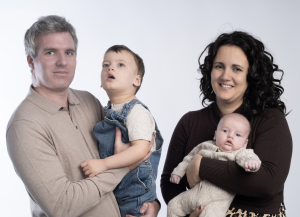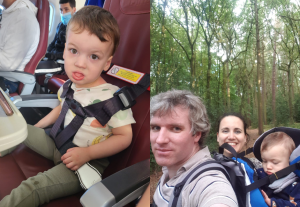
Elijah’s story told by his mum, Lorena
After a year of unusual development traits and epilepsy, Elijah received the diagnosis of MEF2C Haploinsufficiency Syndrome. Elijah is now 4 years old and life still throws it’s challenges for the family. This is their story so far.
I am based in Skelmanthorpe, with my husband James, and my 2 children Elijah (4) and Stefan (5 months).

Since Elijah was born, we noticed some unusual development traits, such as not wanting to latch on the breast for feeding. But it was not until 8 months old when the turmoil kicked off. Epilepsy made an appearance and we got rushed to hospital where Elijah was subjected to an array of tests to try and figure out what was causing his seizures. It wasn’t until Elijah’s first birthday that we got the diagnosis of MEF2C Haploinsufficiency Syndrome, an extremely rare genetic disorder, caused by full deletion of the MEF2C gene. Since then, life has not been easy, he is almost 4 now. He cannot sit independently; he is non-mobile and has severe developmental delay. His developmental age is about 5 months old. We are working hard with many hours of physiotherapy to help him gain mobility and improve his quality of life and ability to experience more of the world.
Everything takes effort for him, but he takes it all in his stride and he is the happiest little boy we know. His laughter (he will make you work hard for it) fills up the room and hearts of all around him. While he is very happy in his own little world and enjoys the small things like cuddles with mum and dad, and his cartoons, we always have the looming worry of what will happen when we are no longer around. Elijah will always be fully dependent on others for even the simplest things, which would make him vulnerable without the protection of a parent or a loved one. Our hope is that the research/drug discovery progresses to the point where it can help him improve his cognitive development, his ability to communicate and his mobility to improve his chance of living a future that is as fulfilled and independent as possible.
The MEF2C Foundation

When doctors give you the diagnosis and tell you ‘we don’t really know much about this’ after the first panicked reaction, and grief from that life you imagined but that you will no longer get, we moved onto researching what could be done if anything, because currently there is no way to treat this condition at all, only symptom ‘management’ is possible, like medication to help with his epilepsy. As we understood more about the condition, we realised that with the right focus and investment a treatment could likely be developed to drastically improve if not cure it, and radically change Elijah’s life and the lives of all affected and alleviate some or all of their demands off the health and social care systems.
As this is an extremely rare condition, we only found 2 major researchers across the world looking into the effect of this gene on the brain. Dr Christopher Cowan Ph.D., was one. Dr Cowan, Chair of the Department of Neuroscience at the Medical University of South Carolina is a leading researcher on MEF2C.
In 2022, we started reaching out and having conversations as to what was possible and formulating a plan.
Early in 2023, we joined forces with a like-minded family and formed The MEF2C Foundation, a UK charity, to help us accomplish our goal to develop a treatment for these children and young adults, while supporting MEF2C Families along the way.
Not long after the foundation was formed, we launched our first major and fully global fundraiser to fund the drug development program with MUSC, which we called ‘Pathways to Hope’. This was an incredible success and we raised over half a million pounds in only a few months (£400k were needed). We are deeply grateful to the growing MEF2C community worldwide that rallied behind us and supported this effort.
What’s next?

We are by no means done. Next, we will need to fund a natural history study and a toxicology study before we can take this through a human critical trial. All this whilst juggling full time jobs, and many, many hours of therapies and various hospital appointments, just for Elijah alone.
As there are only about 350 cases known worldwide, and 45 in the UK, we will continue to push on with the treatment development with the help of all of our advocates, to give all those affected a brighter future.
